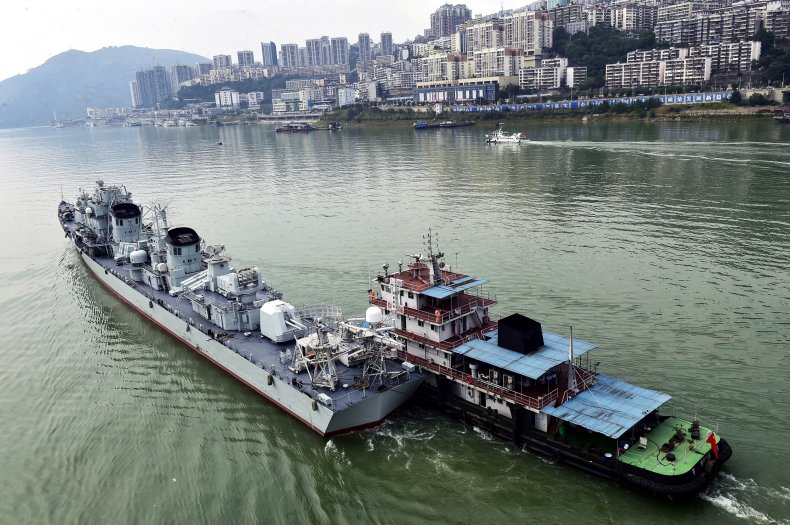Former NATO Supreme Allied Commander Europe James Stavridis warned on Saturday about the Chinese warship that almost collided with a U.S. Navy destroyer in the Taiwan Strait, saying that such incidents could start war.
A video published by Canadian outlet Global News that was also widely shared to social media, showed the Chinese vessel approach the U.S. Navy destroyer and passing within 150 yards of it. The close call comes amid ongoing tensions between China and the United States over a number of issues, including both countries' stance on Taiwan's independence.
The U.S. Navy's Indo-Pacific Command (USINDOPACOM) said on Saturday that the Chinese vessel "executed maneuvers in an unsafe manner" close to the USS Chung-Hoon, which was moving through the Taiwan Strait on June 3 alongside a Canadian frigate, according to reports from HMCS Montréal.
On Saturday evening, Stavridis shared a clip of the close encounter between the vessels and blasted Beijing's People's Liberation Army Navy (PLA) on Twitter.

"As a former sea captain of a similar U.S. destroyer, it almost made my heart stop to watch this video. This is wildly unprofessional and provocative behavior on the part of the Chinese Navy. Wars start with incidents like this. Shame on the PLA Navy," Stavridis wrote.
The U.S. military said that the Chinese ship "overtook Chung-Hoon on their port side and crossed their bow at 150 yards," but the U.S. destroyer maintained its course and slowed down to prevent a collision. It added that the Chinese ship then "crossed Chung-Hoon's bow a second time starboard to port at 2,000 yards and remained off Chung-Hoon's port bow."
The Chinese warship's close confrontation "violated the maritime 'Rules of the Road' of safe passage in international waters," the USINDOPACOM said Saturday in a statement on its website, adding that "the U.S. military flies, sails, and operates safely and responsibly anywhere international law allows."
The incident comes nearly over a week after a Chinese fighter jet performed "an unnecessarily aggressive maneuver" close to a U.S. reconnaissance aircraft on May 26.
As a former sea captain of a similar US destroyer, it almost made my heart stop to watch this video. This is wildly unprofessional and provocative behavior on the part of the Chinese Navy. Wars start with incidents like this. Shame on the PLA Navy. https://t.co/53jmx78L4H
— Admiral James Stavridis, USN, Ret. (@stavridisj) June 4, 2023
"The PRC pilot flew directly in front of the nose of the RC-135, forcing the U.S. aircraft to fly through its wake turbulence. The RC-135 was conducting safe and routine operations over the South China Sea in international airspace, in accordance with international law," USINDOPACOM said in a statement on its website on Tuesday.
The statement continued: "The United States will continue to fly, sail, and operate – safely and responsibly – wherever international law allows, and the U.S. Indo-Pacific Joint Force will continue to fly in international airspace with due regard for the safety of all vessels and aircraft under international law. We expect all countries in the Indo-Pacific region to use international airspace safely and in accordance with international law."
Meanwhile, U.S. Defense Secretary Lloyd Austin warned on Saturday during a speech at the Shangri-La Dialogue that war with China would be "devastating," and warned Beijing against taking further action surrounding the island of Taiwan.
Beijing's "One China" policy stipulates that Taiwan, an island off the country's coast, is part of China. However, Taiwanese leaders consider the island to be its own sovereign nation. Though the United States does not officially recognize the island's independence, it has vowed to defend it against a Chinese invasion.
Austin said at the summit in Singapore that the "whole world has a stake in maintaining peace and stability" in Taiwan, emphasizing the importance of making sure that the commercial shipping lanes in the region are secure. He further warned about the consequences of a war in Taiwan as it impacts global supply chains and freedom of navigation.
Newsweek reached out by email to the International Press Center at the Chinese ministry of foreign affairs for comment.








